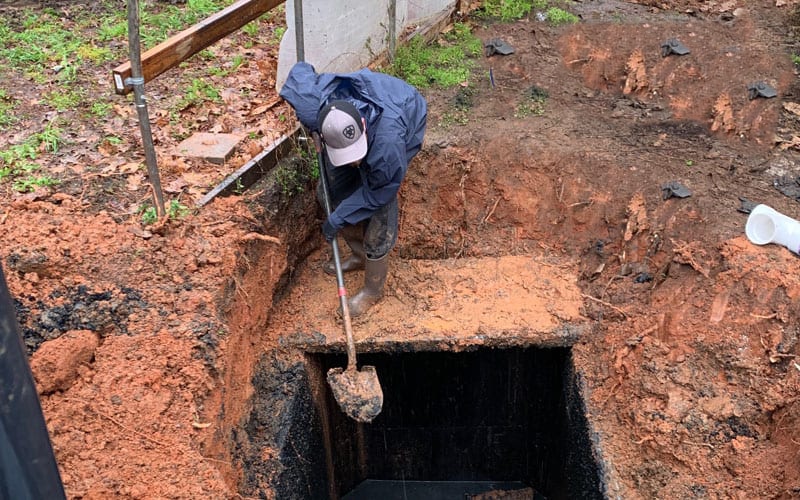Sewer backups are a common issue in North Atlanta and Woodstock, GA. When these events occur, they flood flooring surfaces and other areas with toxic, black water. Filled with biological and chemical contaminants, black water instantly renders both homes and commercial buildings unusable. It can also lead to serious problems with mold and mildew, and major property damages. As such, preventing sewer system backups is key for protecting both your property investment and residents. More importantly, knowing what to do when you’ve got a sewer backing up is essential for limiting loss.
If you have experienced a sewage back up in and around North Atlanta, contact E Dennis today for quick and professional help.
What Causes Sewer Backups?
There are many reasons why sewer backups occur. Sometimes the problem is surprisingly simple. For instance, you want to make sure that no one in your household is flushing paper towels or “flushable” personal wipes down the commode. These paper products do not degrade easily in water. As such, they’re likely to get caught up on minor obstructions as they pass through your sewer pipes and flow out to the sewer main. Once caught, they can collect debris until a formidable blockage exists.
It’s also possible to have a solid, physical obstruction that’s causing the issue. This is the case when exit lines are blocked by items that do not degrade at all. For instance, if your child recently flushed a toothbrush or toy down the toilet, an empty commode doesn’t mean that you’re out of the woods. This hard, physical item will have to make it safely to the sewer main without getting snagged or otherwise caught up. Depending upon their size and shape, flushed, solid materials that get trapped in the exterior pipes leading to the sewer main can take weeks or months to present any major evidence of a building blockage.
Cause #1: Type And Age Of Your Plumbing: Sewer Backups And Old Homes
For those who own old, historic properties in Woodstock, GA, the most common cause of sewer backups is ultimately old, outdated plumbing. If your home has clay pipes leading to the sewer main at its exterior, these structures could become subject to the ravages of invasive weeds, shrub twigs, and tree roots. Natural growths like these enter clay pipes and gradually clog them. Once they do, small pieces of undissolved materials can get stuck on them to create blockages. This is frequently how paper towels and “flushable” personal wipes get snagged. When blockages like these exist, it’s only a matter of time before black water starts backing up into the home.
Are clay pipes at your home’s exterior being slowly clogged with debris? One sure way to tell is by listening for phantom gurgling sounds from your toilets or drains. As the water slowly moves past a blockage in your exterior pipes during times of plumbing inactivity, water and air will be pulled from your plumbing appliances, thereby causing an audible, bubbling sound.
By catching and correcting the problem early on, you may be able to avoid the hassle, stress, and extra costs of having black water professionally extracted. When the sewer backs up in a home that has clay pipes at its exterior, pipe replacement services are often the longest-lasting and most cost-effective solution.
Cause #2: Possibility Of Structural Damage
Cracked or otherwise deteriorated pipes at the property exterior can also lead to problems. If there is any structural damage to the portion of your plumbing that’s installed outside of your home, you may notice wet or excessively muddy patches in your yard, low water pressure, foul smells, and sick or dead foliage. For homes with septic tanks, these same signs will present when major issues exist.
Having a professional plumber perform a camera inspection is the only sure way to verify the integrity of your pipes in outdoor areas. Structural damage or cracks to outdoor pipes is most likely when these systems are already well-aged, or when landscaping work has recently been done in the area. Keep in mind that even heavy storms can cause soil settlement that alters the condition or functionality of your exterior pipes. Thus, if your sewer starts backing up right after you’ve had major yard work done or following a big storm, damages to outdoor plumbing structures are the most likely culprit.
Cause #3: Off-Property Issues
Unless your wastewater is draining to a septic tank, your plumbing system and its end functions are constantly reliant upon the functioning and condition of the city’s sewer main. Determining where the problem lies when you have a sewer backing up is key for assigning fault and responsibility. If there are sewer line repair issues at the main, the city will be responsible for fixing them and will provide reasonable compensation for any resulting property damages. If the city lines fail, clog, or drain slowly, your outside cleanout will be full of water. Conversely, if the cleanout is empty, the problem likely originates within or closer to your home.
Cause #4: Grease, Non-Paper Products, etc.
Never pour grease down your drain. Many people think it is perfectly okay to pour grease and cooking oil down the drain. However, when you pour grease or oil down the drain, it solidifies. This will cause a clog in the drain or in the main sewer pipeline itself.
Never flush disposable diapers, hygiene products, and paper towels down the drain. These will take a long time to dissipate and can create a clog in the line. Even some wipes labeled “flushable” can wreak havoc on your system. The only thing that should be flushed in the toilet, other than waste, is toilet paper.
If your home has a garbage disposal, avoid processing starchy foods like rice and pasta. These can get gummy with water, and over time, clog pipes. Also, avoid things like:
- Coffee grounds: These are dense and clumped. Instead, use them in your garden or compost pile.
- Bones, pits, and shells: They are too much for the disposal to handle and can cause a variety of issues.
- Oatmeal: The same reason you want to avoid pasta.
- Nuts: They become a thick paste, which will cause clogs over time.
- Onion skins: They are too thin to pass through the blades, and end up creating a “net” that catches things, leading to an eventual clog.
- Fibrous vegetables: They can create a sticky mess in the system that will clog the pipes over time.
- Eggshells: The shells aren’t the issue – it’s the thin membrane that often goes with them. It behaves like onion skin.
- Potato peels: Another food waste product that behaves like onion skin.
Cause #5: Improper Lateral Maintenance
It is your responsibility to make sure that you maintain the lateral that connects the city sewer main and your home. If it is filled with tree roots or is cracked, it can lead to backups in your home.
Cause #6: Illegal Plumbing Connections
You will want to make sure that you have no unlawful plumbing connections hooked up. This includes having your sump pump hooked to the line in your sewer. If you have it set up like this, it can cause a backup into your home. Check to make sure that all of your plumbing fixtures are hooked up legally. If you have any questions about whether it is or not, call a local plumbing professional to ensure that it is. If you are not sure what is legal in your area, contact your local city government
Look And Listen: The Subtle Signs Of A Serious And Fast-Developing Problem
If you’re dealing with a major backup, the first and most important question is whether or not your wastewater drains to a city sewer or an on-property septic tank. While both setups serve essentially the same function, how they work and the problems that cause them to malfunction are quite different. With septic tanks, an excessively wet yard that never appears to dry out is a sure sign of a developing issue. With plumbing that’s connected to municipal sewer mains, gurgling or bubbling sounds from toilets, sinks, and other appliances that are not being used should prompt fast action.
Slow-moving drains throughout the entire building are a fairly good indicator of a sewer backup. The most telling sign, however, is having wastewater back up into another drain whenever an appliance is in use. For instance, if you turn on your washing machine, use the shower, or flush the toilet and discover that waste is backing up into another pipe, call a plumber right away. A single blocked drain can usually be cleared with a drain snake or a plunger. When all drains throughout the building are affected, the problem requires prompt, professional attention.
Slow-moving drains and drains that get overflowed with wastewater whenever other appliances are in use are guaranteed to emit unpleasant smells. If you’ve been having an increasingly difficult time freshening your drains or in dealing with pungent, unpleasant drain odors, call a plumber in. Taking action after spotting small signs like these can prevent water damage, mold issues, and more.
How To Prevent Sewage Backup
You will want to do everything in your power to make sure that you never have a sewage backup in your home. Raw sewage backing up in your home is exceptionally disgusting and exposes you and your family to an extreme health risk. Bacteria from the waste can make you extremely sick. These bacteria can permeate your house and can be hard to get rid of. You will more than likely need to call a cleaning company to come out to clean your home if a sewage backup occurs. Also, the floors may need to be replaced, and your walls can be damaged.
Consider replacing your existing pipes with plastic piping. Tree roots cannot break through this plastic, which will create a more secure sewer line.
Consider installing flood control systems with a backwater prevention valve. It will let sewage go out, and it will keep it from coming in again. This is the best line of defense when it comes to sewage backup.
Scheduling once-yearly, whole-house plumbing inspections is the first and most important step in preventing major sewer backups and other serious plumbing problems. These visits give plumbers the chance to catch and correct minor issues before they spiral out of control. You should also diligently school your entire household on good drain care while reminding everyone to keep small-sized, solid objects like razors, toys, and toothbrushes away from open drains. Install drain covers, and be on the lookout for slow-moving drains, drains that bubble and gurgle, and drains that emit foul and suspicious smells.
Take good care of your landscaping, especially if you have clay pipes, weed growth, and large trees at your property exterior. More importantly, talk with your plumber about having outdated plumbing features swapped out. Pipe replacement is generally much cheaper than paying the costs of dealing with ruptured pipes, pipe encroachment, and property damages. Although older homes can be both charming and romantic, the issues commonly caused by their outdated plumbing features are not.
If you suspect something is wrong with your drain lines or the sewer itself, it will need to be addressed as soon as possible. For example, if you have a slow drain in the kitchen sink or your bathroom, this can indicate something is going on with the sewer line. If it goes untreated, the block can become more significant, and eventually, sewage will start to back up in your house, causing costly repairs.
Looking for a Sewage Backup Fix?
Discovering sewage backed up in your home can be scary. You may be tempted to grab your mop or an old towel to start clearing the problem away. When a backup does occur, do not try to fix any portion of the issue on your own. Blackwater is highly contaminated with both chemicals and toxic, biological substances. While there are different ways to unclog sewer lines, the best course of action is to contact E Dennis, your insurance company, and a water damage specialist.
Water damage specialists will use cutting-edge extraction equipment, disinfectants, and drying tools to restore your home back to its former level of safety, habitability, and appeal. Your plumber will correct the underlying problem so that the sewage backup does not recur. Finally, your insurance company can assist with most or all of the resulting costs according to the protections listed in your home insurance policy, and the ultimate cause of the flood event.
Have questions or concerns? Don’t hesitate to reach out!





